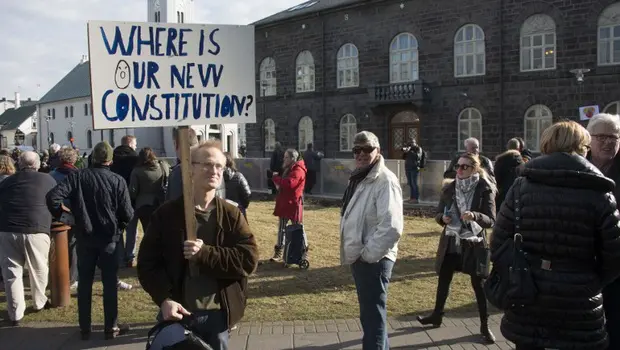The voting is over, the results are in, but Catalonia’s future is no clearer.
Catalonians voted to give pro-independence parties an outright majority in the region’s 135-seat parliament on Thursday, but less than 50 percent of the electorate voted for them.
The center-right unionists Ciudadanos became the largest party and received the biggest share of the vote, but is unlikely to play a role in a future government.
Catalan regional elections results, with 99 percent of votes counted.
"The election has resolved very little," Andrew Dowling, a specialist in Catalan history at Cardiff University in Wales, told AFP. "Independence has won but in a way similar to 2015 – majority of seats but not in votes."
Key players
Catalonia is set for weeks of negotiations, in which four individuals are likely to play central roles.
1. Ines Arrimadas (Ciudadanos)
The 36-year-old was a winner and loser on Thursday, becoming the leader of the largest party in parliament but probably not having enough allies to form a government. Originally from southern Spain, the charismatic lawyer has had a big influence on the campaign but conceded that being part of a coalition would be tough.
2. Carles Puigdemont (Together for Catalonia)
The former president of Catalonia, removed by Rajoy, won the second largest share of the vote and heads the largest pro-independence party. However, the 54-year-old has been campaigning via video-link from Brussels after going into exile in October. Madrid issued a warrant for his arrest after he declared independence from Spain; he claimed he wouldn’t receive justice.
3. Mariano Rajoy (Spanish PM)
The Spanish prime minister sacked the Catalan government after independence was declared on October 27 and called snap elections in the hope of establishing “legality and normality.” The 62-year-old is the one major figure to have suffered a clear loss in the elections. Not only did pro-independence parties win a majority, but his own People’s Party suffered a sharp drop in support.
4. Oriol Junqueras (Republican Left)
The 48-year-old, who campaigned from prison, faces charges of sedition and rebellion for his role in October’s independence referendum and its aftermath. He has said he would be willing to “shake hands with Madrid”, and although he served as Puigdemont’s deputy, the pair are fierce rivals.
Key questions
Has the independence question been settled?
No. The election results only showed more clearly how divided Catalonia is over its future. A record turnout of 82 percent was an indication of how big an issue this is for all Catalonians.
What happens next?
Negotiations to form a government are likely to start in early 2018, and parliament must vote on a new government by February 8. If no leader can command an absolute majority, a second vote will be held in which a leader only needs a majority of votes cast in the chamber. If no solution is found after two months, new elections will be held.
**Can the pro-independence parties form a coalition? **
The three separatist parties now have a slim majority in parliament, but there are tensions between the leaders. Puigdemont and Junqueras have a poor relationship, and different views on the future of Catalonia. And one is in exile in Belgium, the other in jail. Even if they do find a way to take their seats, it's not clear Puigdemont would be welcomed as the leader of the bloc.
**Can a cross-divide coalition be formed? **
The campaign was dominated by the independence issue, with little debate about regional policy on issues such as public education, inequality and unemployment. For a pro-unionist, pro-independence coalition to be formed would take a major concession.
**Who would lead a pro-independence coalition? **
The leaders of the main separatist parties -- Puigdemont and Junqueras -- are in exile or jail along with 18 other former ministers and activists. Puigdemont faces jail if he returns to Spain from Belgium, the charges against Junqueras could lead to a 30-month prison sentence. It's not clear if either could lead the region.
A screen reading "Independence parties outright majority" is seen at a gathering of the Catalan National Assembly following Catalonia's regional elections in Barcelona, Spain on December 21, 2017. /Reuters Photo
**What will the absent politicians do? **
Several pro-independence figures who were elected on Thursday are either in jail or in exile. What they do next could be crucial – without them a separatist coalition wouldn’t have a voting majority. They could renounce their seats and pass them on to other party members, or hope that charges are dropped if they pledge not to pursue independence unilaterally.
**How would Spain react to a pro-independence government? **
Rajoy would likely sack any government that declared independence, so a pro-independence coalition would probably seek talks with Madrid to negotiate a longer term compromise. With relations between the camps bitter, the lead negotiators of the two sides could be critical.
**What next for Arrimadas? **
The pro-business Ciudadanos leader was a big success on the campaign trail and helped her party to the largest number of seats and the largest share of the vote. She looks destined to lead the opposition in parliament, unless an unlikely coalition can be struck.
**What does the result mean for Catalonia’s economy? **
The instability that followed the October 1 independence referendum led to over 3,000 businesses moving their headquarters from Catalonia, and Thursday’s result has done little to quell instability. The northeastern region is vital for Spain’s economy, accounting for around 19 percent of the country’s gross domestic product.
(CGTN)
 简体中文
简体中文



